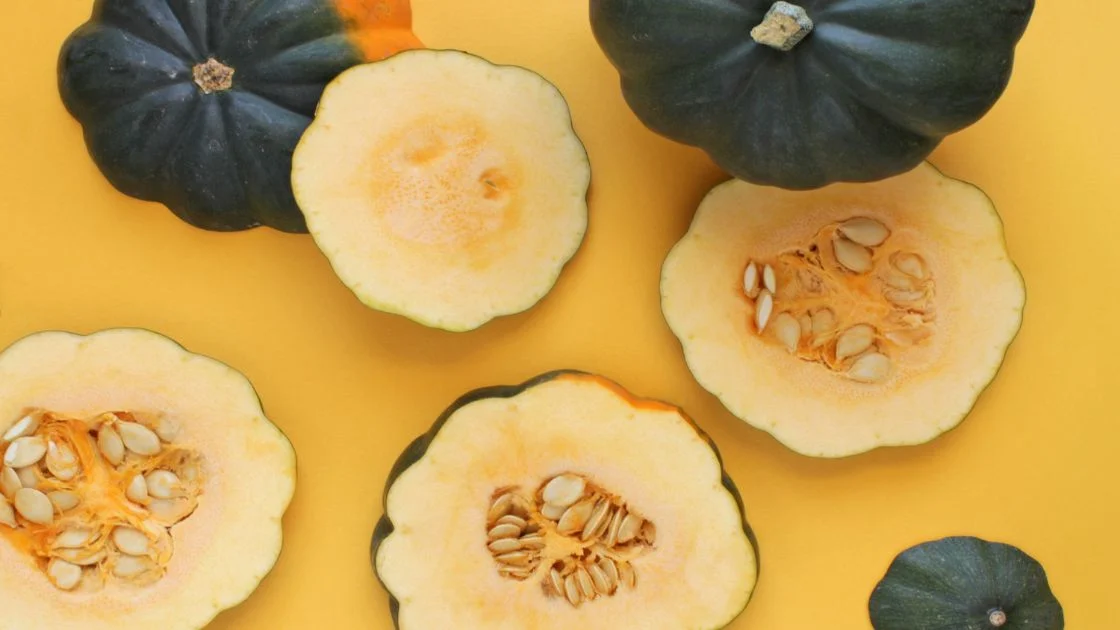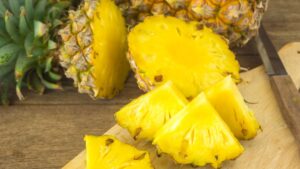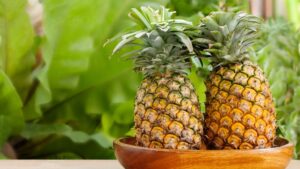- It is sweet, nutrient-packed, and has a slightly nutty taste
- Despite being classified as a fruit, it is considered a starchy vegetable
- It is rich in vitamins, minerals, and antioxidants
- It offers health benefits such as improved eye health, reduced risk of heart disease, and skin protection
- It can be prepared in various ways and is a versatile and nutritious addition to any meal
Acorn squash features sweet flesh, orange-yellow in color, and slightly nutty in taste.
If you haven’t eaten it, you should do it. You will love its flavor.
They are considered starchy vegetables even though they are botanically classed as a fruit.
Like potatoes, butternut squash, and sweet potatoes, they can be prepared similarly to other high-carb veggies.
Read on and learn about the nutrients and benefits that acorn squash has to offer.
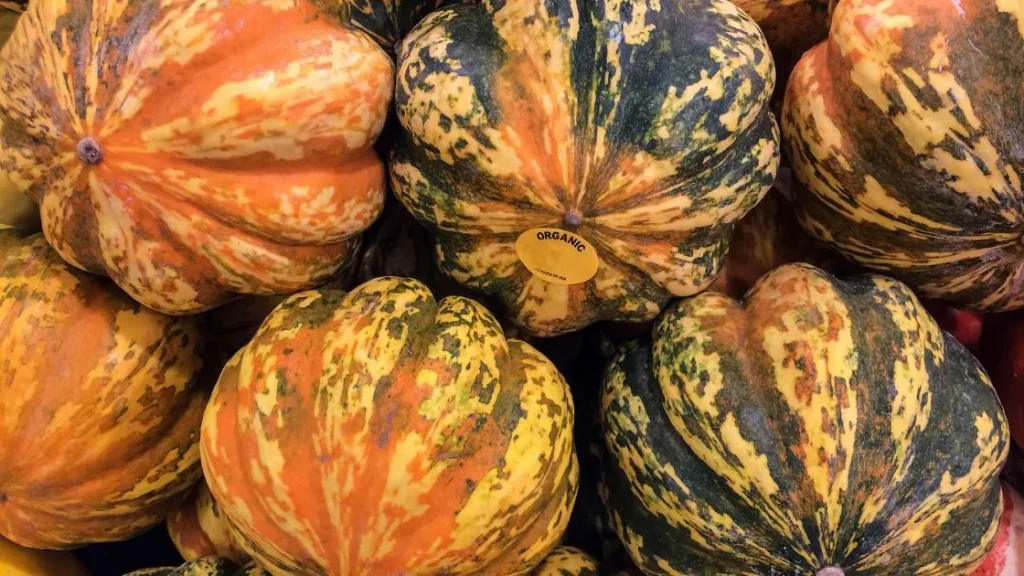
Physical description
Acorn squashes are normally between four and seven inches long and weigh one to two pounds.
The stem has a scratchy texture.
The most typical variety is dark green on the outside, frequently with a single orange spot on the side or top.
As implied by the name, it has an acorn-like form.
However, more recent forms, such as the golden acorn and white varieties, have emerged.
History and production
The acorn squash belongs to the Cucurbitaceae, or gourd family, and includes the winter squash variety.
For more than 8,000 years, North American diets have included this species.
It was initially grown in Central America and quickly spread throughout the entire continent.
Subsequently, various variants of the same family of cucurbits began to be cultivated, including:
- Zucchini
- Pumpkin
- Butternut
- Acorn squash
Squash farming is an exciting thing for many people. This is how Mario Batali thinks:
Nutrients of Acorn squash
1 cup of 140 grams of Acorn Squash has:
- 56 Calories.
Vitamins
- Vitamin A, RAE 25.20 mcg – 3 % of DV
- Lutein + zeaxanthin 53.20 mcg
- Carotene, beta 308.00 mcg
- Riboflavin [Vitamin B2] 0.014 mg – 1 % of DV
- Thiamin [Vitamin B1] 0.196 mg – 16 % of DV
- Pantothenic acid [Vitamin B5] 0.560 mg – 11 % of DV
- Niacin [Vitamin B3] 0.980 mg – 6 % of DV
- Folate, DFE [Vitamin B9] 23.80 mcg – 6 % of DV
- Vitamin B6 0.216 mg – 13 % of DV
- Vitamin C [Ascorbic acid] 15.4 mg – 17 % of DV
- Folate, food 23.80 mcg
Minerals
- Copper 0.09 mg – 10 % of DV
- Calcium 46.20 mg – 4 % of DV
- Magnesium 44.80 mg – 11 % of DV
- Iron 0.98 mg – 5 % of DV
- Phosphorus 50.40 mg – 4 % of DV
- Manganese 0.234 mg – 10 % of DV
- Selenium 0.70 mcg – 1 % of DV
- Potassium 485.80 mg – 10 % of DV
- Zinc 0.18 mg – 2 % of DV
- Sodium 4.20 mg – 0 % of DV
Proteins and Aminoacids
- Alanine 0.046 g
- Protein 1.12 g – 2 % of DV
- Aspartic acid 0.120 g
- Arginine 0.062 g
- Glutamic acid 0.196 g
- Cystine 0.010 g
- Histidine 0.021 g – 2 % of DV
- Glycine 0.041 g
- Leucine 0.063 g – 2 % of DV
- Isoleucine 0.043 g – 3 % of DV
- Methionine 0.014 g
- Lysine 0.041 g – 1 % of DV
- Proline 0.039 g
- Phenylalanine 0.043 g
- Threonine 0.034 g – 2 % of DV
- Serine 0.043 g
- Tyrosine 0.038 g
- Tryptophan 0.015 g – 4 % of DV
- Phenylalanine + Tyrosine 0.081 g – 3 % of DV
- Valine 0.048 g – 2 % of DV
- Methionine + Cysteine 0.014 g – 1 % of DV
Carbohydrates
- Carbohydrate 14.59 g – 5 % of DV
- Net carbs 12.49 g
- Fiber 2.10 g – 8 % of DV
Fats and Fatty Acids
- Fat 0.140 g – 0 % of DV
- Hexadecanoic acid 0.025 g
- Saturated fatty acids 0.029 g – 0 % of DV
- Monounsaturated fatty acids 0.010 g
- Octadecanoic acid 0.003 g
- Polyunsaturated fatty acids 0.059 g
- Octadecenoic acid 0.010 g
- Octadecatrienoic acid 0.036 g
- Octadecadienoic acid 0.022 g
Other
- Water 122.89 g
- Ash 1.26 g
Health benefits of Acorn squash
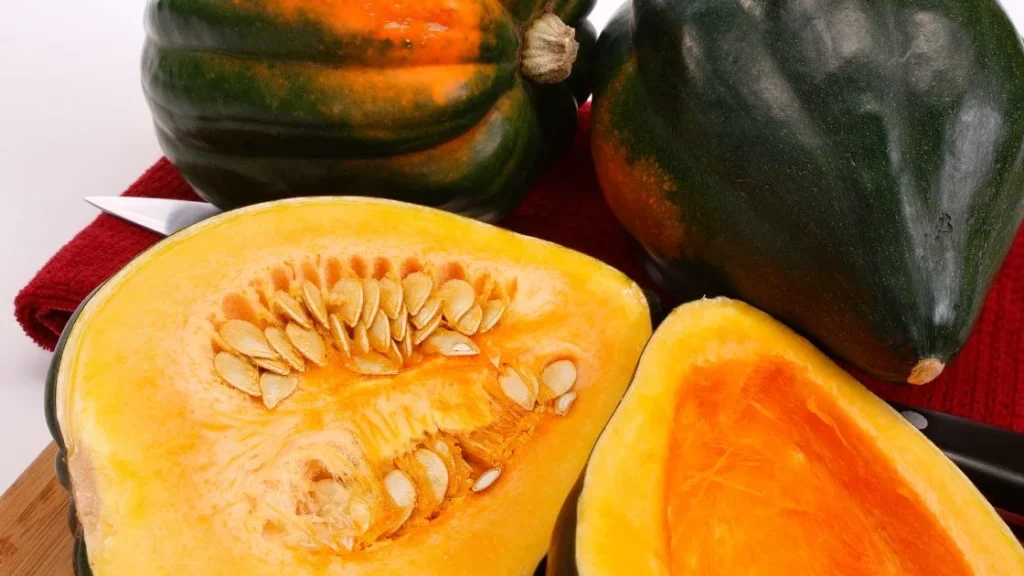
Eye Care
Our body is capable of creating vitamin A from the alpha and beta carotene in acorn squash. With just a half-cup serving of cooked acorn squash, we will get 9% of the recommended daily amount of vitamin A.
Vitamin A is used by our body to hydrate our eyes and nourish our cornea, which is essential for healthy vision.
Reduced Risk of Stroke and Heart Disease
One of the highest amounts of heart-healthy vitamins per serving can be found in acorn squash.
Eating foods that are naturally rich in carotenoids, including acorn squash, may help reduce the risk of cardiovascular disease.
Skin Defense
Beta-carotene from acorn squash and related minerals can help shield the skin against sun damage and cancers. Even yet, additional research is required to determine the ideal dosing.
A reliable supply of antioxidants
Antioxidants are substances that protect against cell deterioration, and acorn squash is a rich source of them.
Carotenoids, which are plant pigments with powerful antioxidant properties, are particularly abundant in acorn squash. In fact, the winter acorn squash is the densest source of the carotene alpha pigment, only surpassed by carrots.
High diets in the acorn squash carotenoids Alfa, Beta, and Zeaxanthin can help against type 2 diabetes, cancer, and mental deterioration.
Acorn squash is also abundant in vitamin C, which has strong antioxidant effects, in addition to carotenoids.
To get more antioxidants, we can also consume broccoli, bananas, spinach, and mangoes.
Do you know how to prepare acorn squash?
Try these squash recipes.
Best Acorn Squash Recipes
Coconut and squash

Preparation time: 15 minutes
Serving: 4
Ingredients:
- 1 tablespoon of vegetable oil
- 100 grams of chopped onions
- 500 grams of squash (approximately squash half)
- 400 grams chopped tomatoes
- 4 heaped tablespoons of mild curry paste
- 400 grams of lentils, drained
- 400 grams can of light coconut milk
- 150 milliliters of coconut yogurt
- 200 grams of spinach
- Naan bread to serve.
Procedure:
- In a large skillet, heat the oil.
- Put the squash and a little water in a bowl.
- After the squash is tender, cover it with cling film and microwave on high for 10 minutes.
- The onions should be added to the hot oil and cooked for a few minutes until tender.
- Once the sauce has thickened to your desired consistency, add the curry paste, tomatoes, and coconut milk.
- Naan bread can be heated in a toaster or oven.
- Add the lentils, spinach, and spices to the sauce after draining the liquid from the squash.
- To wilt the spinach, simmer an additional 2 to 3 minutes; then, add the coconut yogurt.
- Serve with an additional dollop of yogurt and warm bread.
Red lentils and squash

Preparation time: 40 minutes
Serving: 4
Ingredients:
- 1 onion
- 1 tablespoon of sunflower oil
- 1 tablespoon ground coriander
- 1 garlic clove
- 1 tablespoon ground turmeric
- 1 tablespoon ground cumin
- 400 grams of squash (cut the squash into cubes)
- 1 tablespoon cayenne pepper
- 1.2 liters of chicken stock
- 400 grams of canned chopped tomato
- Coriander, roughly chopped
- 300 grams red lentil
- 1 heaped gram of mango
- Salt and pepper
- Naan bread to serve
Procedure:
- Cook the onion and oil in a saucepan for five minutes.
- The squash and spices are added after adding the garlic and cooking for another minute. Mix all of the above.
- Add chicken stock, hot sauce, and diced tomatoes, and season to taste.
- Bring to a boil for 10 minutes.
- Add the lentils and simmer for another 20 minutes when the squash is cooked.
- If you like sweet flavors, you can add a little butter and brown sugar.
- Serve the dish with warm naan bread after adding the coriander.
- Note: Make this recipe when you have cravings for grains. You will love squash.
Curious notes about squash:
- Roast acorn squash is a different way to eat it without adding extra calories.
- Any protein can serve as stuffed acorn squash. Just choose the one that is more savory for you.
- Baked acorn squash is perfect and easy to prepare side dish. You only need a baking sheet to place the squash in the oven.
- Buying squash in half is a way to verify its good food condition.
- There are seeds inside the squash. Whenever you cook squash, you should cut the squash in half and scoop out the seeds.
- Always preheat the oven to prepare roasted squash.
- It is recommended to cut the acorn squash in half to prepare it. Working in the kitchen with acorn squash halves is easier than working with the whole squash.
- Squash seeds are very similar to pumpkin seeds.
Others ways to enjoy Acorn Squash
Roasting acorn squash is a popular way to bring out its natural sweetness.
To do this, cut the squash in half, scoop out the seeds, and place it cut-side down on a baking sheet.
Roast in a preheated oven at 400°F for about 40-45 minutes until the flesh is tender and caramelized.
Drizzle with a little maple syrup and sprinkle with cinnamon for added flavor.
When cutting acorn squash, it’s important to use a sharp knife and a stable cutting board.
The skin can be tough, so a sharp knife will help make clean cuts.
Be cautious and take your time to avoid any accidents.
Another delicious way to enjoy acorn squash is in a casserole.
Try combining roasted acorn squash with cooked quinoa, cooked sausage, chopped cauliflower, and dried cranberries.
Season with oregano, nutmeg, and a drizzle of maple syrup.
Bake in the oven until everything is heated and the flavors melded together.
Don’t be discouraged by the stringy bits that may be present in the acorn squash skin.
These can easily be removed before eating or can be left on for added texture.
Some people even enjoy eating the skin, as it adds a slightly chewy element to the dish.
If you’re in the mood for something sweet, acorn squash can also be used in desserts.
Try making a pumpkin pie with roasted acorn squash instead of pumpkin.
The flavor is similar, but the texture may be slightly different.
Add some cinnamon, nutmeg, and maple syrup to the filling for a delicious twist on a classic dessert.
Eat Acorn Squash
Acorn squash has a number of nutrients that we should not miss. Its low calories per serving make it a beneficial food in aiding weight loss.
Acorn squash is a versatile and nutritious vegetable that can be enjoyed in a variety of dishes.
Whether you’re roasting it, adding it to a casserole, or using it in a dessert, acorn squash is a delicious and healthy addition to any meal.
Any of the types of squash have significant nutritional value, so don’t think about it; eat them and enjoy their benefits.
Don’t miss out on the benefits that this sweet and nutrient-packed carb has to offer.

I am a professional health and nutrition writer with extensive experience in the industry. My passion for sharing valuable insights on nutrition and wellness stems from over 15 years of personal training and maintaining a healthy lifestyle. My commitment to continuously educate myself on the latest trends and research in the field allows me to deliver high-quality content that is informative and engaging. My mission is to empower individuals to make informed decisions about their health and well-being through my writing.
